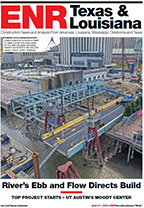
Team members building the Silver Spring Transit Center, a major mass transportation hub in the heart of Silver Spring, Md., a Washington, D.C., suburb, continue to point fingers at each other as the project remains in limbo.
Project contractor Foulger-Pratt, Rockville, Md., has filed numerous notices of claims against Montgomery County, the owner, for unnecessarily delaying the project.
The most recent of those, filed on Jan. 18, contends that the county owes the contractors $7,525 per day if the project continues to be delayed after Feb. 26. The project cost has spiraled from original estimates of $35 million to more than $100 million, largely as a result of change orders.
The project was supposed to have been completed in September 2012, according to Patrick Lacefield, the county’s public information officer. But the county’s concerns over the thickness of the concrete poured on two of the slabs in the facility’s upper levels as well as cracks in the deck halted work on the project in 2010.
The center would connect local buses, the Metrorail subway and MARC commuter trains as part of the city's upgraded downtown.
Foulger-Pratt’s managing principal, Bryant Foulger, says that an analysis performed last year by engineers that the contractor hired concluded that the structure is safe. Nevertheless, the firm offered to make any fixes that the county deemed necessary.
According to Foulger, the county has refused to meet with the contractor and its engineers.
“We’ve completed everything except some late-issue change order work,” Foulger says. “We’re sitting on our hands waiting almost a year for the county to give us some direction…We’re really frustrated.”
In its Jan. 18 delay claim, Foulger-Pratt senior project manager Brett Harton provides a glimpse into the ill will that now surrounds the project. At a time in 2011 when Foulger-Pratt believed all parties would be working together to correct slab problems, county staff took a confrontational approach, he claims. That included what he terms a "combative letter" from the county's contract administrator.
In the claim, Harton also accuses the county of refusing to conduct meetings or allow "professional dialogue" between county officials and Foulger-Pratt engineers and consultants.
Lacefield says that the county is waiting for an analysis of its own from Washington, D.C.-based KCE Structural Engineers to determine what needs to be done, if anything, to fix the facility. Until KCE releases its report, he says it is premature to have discussions on any particular claims or to meet with Foulger.
“No one wants to get this done quicker than we do, but what we want to make sure of is that when we start to fix something, it’s the right thing to be fixing,” he says.
Foulger responds that “the county certainly has the right to have somebody come in and look at anything—it is their building. But while they’ve had this engineer in place, the county has not allowed us or our engineers to have a conversation with [KCE].”
The Jan. 18 Foulger-Pratt claim also says that it learned from an article in The Washington Post that the county and contractor had finally settled down to work collaboratively to finish the job. Foulger-Pratt says it also learned from the article that the county had a new work plan. But the new approach doesn't seem to have taken hold.
Meanwhile, the costs for the project keep escalating. “There [is] literally still pending millions of dollars of change order work,” says Judah Lifschitz, Foulger’s attorney, largely to address what he says are incomplete and flawed designs from the county.


